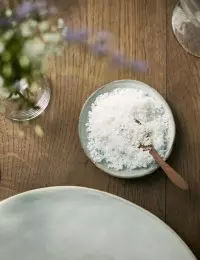
How much salt should I eat in a day?
Highly appreciated for its flavor that sublimates our dishes, salt remains, to say the least, a subtle ingredient that we need to know how to handle in order to master its taste and virtues. Its gustatory notes that arouse our taste buds and senses leave no one indifferent, so here are a few tips to learn how to control the amount of salt in your eating habits.
Summary
Sodium: an essential nutrient for health
Much more than a natural flavour enhancer, salt has nutritional qualities that are essential to the proper functioning of our bodies. When consumed in reasonable quantities, salt contributes to the proper functioning of muscles and the nervous system, regulates blood pressure and plays an important role in keeping the body hydrated. It also carries oxygen, sugar and other essential nutrients to our organ cells.
How many grams of salt per day?
Adults are advised to have a daily salt intake of at least 2 grams and never exceed 5 grams, bearing in mind that salt is generally already naturally present in many foods. The amount of salt per day is obviously not the same for children, for whom the addition of extra salt is forbidden before the age of one.
The effects of excessive salt consumption
Getting the right amount of salt in your daily diet is vital to your health, because excess salt can lead to:
- High blood pressure
- Strokes
- Heart disease
Which foods contain salt?
First and foremost, it's important to know which salts are good and which are bad. Good salts are naturally present in milk and its derivatives, but also in fruit and vegetables, water (whether mineral or spring) or seafood, and quite naturally in table salt.
As for bad salts, 80% of them come from processed foods. The difference between the two lies in the fact that sodium is added during food processing.
How can I reduce my salt intake?
Here are a few recommendations to help you reduce your salt consumption at home and prevent excesses:
- Avoid consumption of processed products and ready-made meals.
- When you go shopping, refer to the nutritional values on the back of products.
- This can be an opportunity for you to start transforming your eating habits and spend some quality time with your loved ones in the kitchen around the preparation of homemade dishes. For those who are short on time, the little trick is to cook in advance or make larger quantities and then freeze them.
- Fruit and vegetables will be your best allies, so opt for a diet rich in fiber!
- Don't hesitate to vary the pleasures by turning to other seasonings like spices or fresh herbs. In addition to enjoying a journey of flavor, you'll add a touch of color to your dishes.
- Reducing your salt intake doesn't mean banishing it from your plates. To sublimate the taste of your food, simply be meticulous in controlling the amount of salt you add.
The composition of Guérande salt
Unlike other salts, Le Guérandais Guérande Salt is unrefined (untreated), so it hasn't been bleached and retains all its properties. Its little extra? It's suitable for all uses.
Gourmet recipe ideas using salt
Now that you know all about the properties of salt and how best to use it, why not try a new recipe?
You could try our recipe for fish skewers accompanied by vegetables, fine herbs and lemon for a tangy note. An easy, practical meal for those days when you don't have much time to devote to cooking. 25 minutes top chrono!"
To finish on a fruity and colorful note, let yourself be tempted by a fruit salad with Fleur de sel Le Guérandais and mini meringues!
To sum up, for healthy salt consumption without excess, give preference to home-cooked, fiber-rich meals, and make sure you use quality, untreated salt whose natural essence has been preserved.
How would you like to learn to master the art of salting? Le Guérandais gives you all his tips with his application Bien saler !




